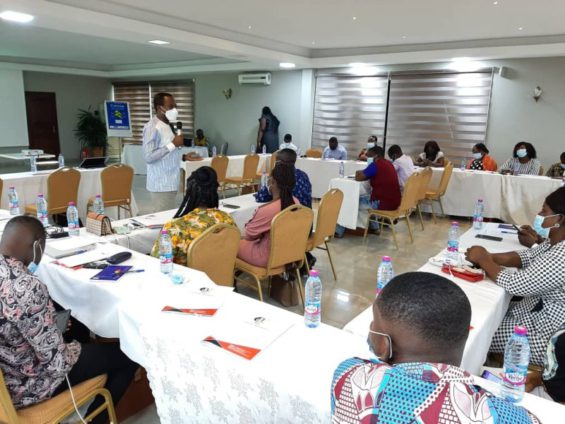
Audio By Carbonatix
Acting Head of the Disease Surveillance Department of the Ghana Health Service (GHS), Dennis Laryea says door handles at public places do not necessarily spread Covid-19 infection.
He said some members of the public used their elbows to open doors at public places, insisting that “Don’t worry about touching door handles, what you do after touching the handles is the most important thing.”
Dr Laryea, who was speaking at the opening of a two-day workshop in Kumasi for some selected journalists across the country, said people could open doors with their hands, but should properly sanitize their hands immediately.
He said most people sanitised their hands, and not their elbows which they inadvertently touched with their hands in the course of the day.
Contrary to some misconception that food could spread Covid-19 infection, the Acting Head of the Disease Surveillance Department emphasized that “There is no evidence that consuming food is associated with Covid-19 infection.
“Sometimes, people focus on the wrong information that when somebody has Covid-19 and sells food to you, you will get Covid-19. Is not eating the food that will give you Covid-19.
“If the person hands over money to you, you take it and don’t sanitise your hands, and touch your face, you might get the infection from that and not eating the food the person gave to you,” Dr Laryea said.
On the use of face masks, he insisted that face masks must be properly worn, and explained that the band on masks, especially the surgical and N95 masks was meant to be shaped around the contour of the nose for proper protection.
On the case count in the country, he said the cumulative cases in the country as of October 21, 2021 stood at 129, 948, discharges were 126, 813 with 1,170 deaths while active cases were 1,965.
Madam Offeibea Baddoo, the Communications Officer of UNICEF said Covid-19 was not peculiar to only adults but also affected children, and encouraged journalists to take interest in child protection issues, especially in the era of Covid-19.
An Official from the Ministry of Information, Mr Kweku Obeng-Adjei who spoke on the impact of Covid-19 pandemic and the role of journalists, reminded them of their responsibility to provide coverage of the pandemic to combat public misconception.
He said “The media must make conscious effort to verify source of information and report objectively the facts rather than opinions.
“Journalists need to collaborate with medical experts to carefully sift through the information to be shared with the public to enable them make informed choices to stay safe,” Mr Obeng-Adjei added.
Latest Stories
-
Adom FM’s ‘Strictly Highlife’ lights up La Palm with rhythm and nostalgia in unforgettable experience
1 hour -
Ghana is rising again – Mahama declares
5 hours -
Firefighters subdue blaze at Accra’s Tudu, officials warn of busy fire season ahead
6 hours -
Luv FM’s Family Party In The Park ends in grand style at Rattray park
6 hours -
Mahama targets digital schools, universal healthcare, and food self-sufficiency in 2026
6 hours -
Ghana’s global image boosted by our world-acclaimed reset agenda – Mahama
6 hours -
Full text: Mahama’s New Year message to the nation
6 hours -
The foundation is laid; now we accelerate and expand in 2026 – Mahama
7 hours -
There is no NPP, CPP nor NDC Ghana, only one Ghana – Mahama
7 hours -
Eduwatch praises education financing gains but warns delays, teacher gaps could derail reforms
7 hours -
Kusaal Wikimedians take local language online in 14-day digital campaign
8 hours -
Stop interfering in each other’s roles – Bole-Bamboi MP appeals to traditional rulers for peace
8 hours -
Playback: President Mahama addresses the nation in New Year message
8 hours -
Industrial and Commercial Workers’ Union call for strong work ethics, economic participation in 2026 new year message
10 hours -
Crossover Joy: Churches in Ghana welcome 2026 with fire and faith
10 hours

